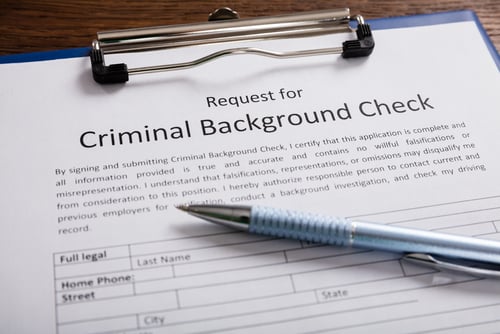
Screening tenants for your rental property is one of the most crucial tasks of a landlord. Applicant screening is a property owner’s first and best defense against troublesome tenants. Generally speaking, the applicant screening process can be broken down into several components – Pre-Screening, Application, Income Verification, Credit Check, Criminal Background, plus Rental History, and Reference Check. Below we take an in-depth look at these different qualifications, why they are important, and what to look out for when screening tenants.
A Quick Look at the Fair Housing Act
Before you begin your search for a new tenant, it is vital to understand Fair Housing Laws. The Fair Housing Act was put in place to protect against discrimination for individuals in protected classes. It covers everything from harassment, retaliatory behavior, and threats to the property’s discriminatory or exclusionary advertising. Failing to meet guidelines or being accused of any type of discrimination, either real or implied, is a legal disaster with potentially crippling financial consequences.
So, to avoid this, every tenant, potential applicant, or individual must be treated to the same and held to the same standards. If you ever have any doubt about something you are doing, check with a qualified legal professional. Keep in mind that local jurisdictions may also have additional protected classes not listed under the federal act. Therefore, you should check your local laws to make sure you adhere to all requirements.
Protected Classes Under the Fair Housing Act
- Race
- Color
- National Origin
- Religion
- Sex
- Familial Status
- Disability
Additional Protected Classes at a Local Level
- Age
- Sexual Orientation
- Source of Income
- Marital Status
- Gender Identity
- Ancestry
The Practice of Pre-Screening Potential Renters
Many landlords are familiar with screening via a set list of qualifications beginning with filling out an application. However, we highly recommend beginning with the practice of pre-screening prospects. Not only will this save time in the long run, but it also helps you determine who is truly serious about applying, and who is just looking. The first contact you make is the perfect time to tell applicants about your standard qualifications and gauge their interest level. So, with Fair Housing Laws in mind, take a look at some pre-screening questions to ask before setting up your first showing.

Common Tenant Pre-Screening Questions
- What is your time-frame for moving?
- Do you have pets?
- How long have you been in your current home?
- Why are you looking to move?
- How many occupants will be living in the unit?
- The property is non-smoking; are you able to comply?
- We require three times the monthly rent in income to qualify. Do you meet this?
- Are there any issues I should know about before I run a background screening for all the household adults?
- Have you ever been evicted or broken a rental agreement?
- What are you looking for in your next home?
The New Tenant Application Form
Once tenants have been pre-screened and viewed the property, it is time to apply. Requiring tenants to fill out a new resident application form is standard practice and if you have the ability to do this electronically, even better! Nowadays, landlords have access to various management software that can streamline the application and screening process.
Top Tenant Screening Software Programs
- AppFolio Property Manager – Appfolio is a full-service property management software. It allows you to easily manage your properties on a single platform that is ultra-user friendly. They offer tools to handle everything from rent collection to online tenant portals and maintenance requests. There are costs, but for such a user-friendly platform, it is well worth it.
- Propertyware – This handy platform allows landlords to complete a wide range of tasks in an easy to follow, easy to learn the software. The programs are easily customized to fit your needs; whether you have two properties or 2,000, Propertyware can handle it all. Pricing begins at $1 per month per unit plus an additional start-up fee.
- Buildium – Looking for an all-inclusive service provider, Buildium is it. Like the other sites we have mentioned, Buildium includes convenient services such as online tenant portals, a professional website, and even community management tools.

Screening Tenants for Income and Employment Verification
Income is an important part of the qualification process. Landlords will want to verify that the prospect has a sufficient source of income to afford the monthly rent. Generally, a good rule of thumb widely accepted throughout the industry is 3 times the monthly rent.
Types of Income Verification for Screening Tenants
- W2 or Paystubs – Income is easily verified through recent pay stubs, W2, or a quick call to the employer’s HR department. Landlords should request to see, at minimum, the last 2 or 3 most recent pay statements.
- 1099 or Schedule C – Not every situation is straightforward. Individuals find work in many ways, and not every source of income is easily verifiable. For example, independent contractors, freelancers, or self-employed people require some added due diligence on your part, but it is not impossible. These individuals should provide a 1099 or Schedule C Tax Form to help you evaluate their earnings against the standard qualifications. If, for some reason, they do not have or are unwilling to provide this, that is a red flag.
- Bank Ledgers – For individuals that fall under #2, income may vary seasonally or even month to month. Therefore, requesting the last 3 months of bank statements to show regular deposits in enough to meet the qualifications is crucial.
When to Require Additional Security
The ability to collect rent on-time is fundamental to the success of your investment property. When the income verification methods above still leave lingering doubt, landlords do have some options. After all, the goal is to ensure the rent will be paid in full and on time, therefore added security may be required. Options for landlords include:
- Additional Security Deposit – Most jurisdictions will allow up to 2 times the monthly rent as a security deposit. Charging at the high end of this for tenants who only barely income qualify can protect landlords against non-payment or unforeseen circumstances.
- Require a Co-signer – This is someone who agrees to pay any debts if the person becomes delinquent on their rent. Keep in mind, co-signers must have enough income to cover their own residence and the expenses of the person they are co-signing for. These individuals must sign the lease and have excellent credit with at least 6 times the monthly rent in verifiable income.
How a Credit Report is Used in Screening Tenants
Creditworthiness is the next deciding factor in the tenant screening process. Some say that while income shows a person’s ability to pay, credit reports highlight their willingness to pay. When evaluating creditworthiness, landlords must look at both the score and the report to get a full financial picture. In most cases, someone with a high credit score is unlikely to have a poor credit history. On the other hand, someone with a low score may have explainable events to investigate. Continue as we break down the important factors when evaluating creditworthiness.

Credit Report vs. Credit Score
Firstly, a credit report and a credit score are different things. However, both provide valuable insight into a tenant’s potential to pay their rent and utilities on time.
Three reporting bureaus compile credit reports: Experian, Equifax, and TransUnion. Each of the three bureaus maintains its own report, so pulling more than one is beneficial. These documents offer a record of an individual’s credit history, payment history, outstanding debt, and any sums in collections.
A credit score is a numerical value that measures an individual’s credit risk. These figures are assigned based on the contents of an individual’s credit report provided by FICO, VantageScore, or individual banks with their own proprietary scoring system.
What to Look for On Credit Reports
- Minimum Scores – We recommend a score no lower than 600, no matter the explanation for the low score. If your rental has a particularly high rent amounts, it is prudent only to accept those with higher credit scores as their obligations are more challenging to meet, and trustworthiness is essential.
- Accounts in Collections – When a person is in collections, that means they failed to pay a bill for an extended time. So, after repeated attempts to collect the original creditor’s debt, eventually, the creditor enlists the help of a collection agency. When someone demonstrates a lack of ability to pay their debts, they are not a good candidate for paying their rent, either.
- Outstanding Utility Bills – If there is an outstanding balance, utility providers may not turn on new service until past due amounts are paid in full. Additionally, a tenant who does not pay for essential needs like utilities may not reliably pay their rent.
Processing Background Checks for Tenant Screening
Next up, we move on to screening tenants for criminal history. To safeguard your property and neighbors, take time to verify that you are not leasing to any violent criminals, felons, or those with outstanding judgments against them. Not every encounter with law enforcement is a deniable offense; however, we list the top things to look out for on a criminal record below. Individuals convicted of any of the following should be denied:

Basic Screening Standards for Background Checks
- Any felony convictions within the past 7 years
- Domestic violence
- Assault and battery
- Major drug charges
- Sexual assault
Additionally, no tenant should have any outstanding judgments against them by a prior landlord. If they do, this is a huge red flag, even if the dispute has been resolved.
While this is not a complete list of the possible charges and convictions to be mindful of, they are the most serious. For any other charges and convictions you come across, consider the nature of the charge, whether the person has been convicted or not, and how long ago the event happened. Keep in mind that the Federal Fair Housing Act prohibits the blanket refusal to lease to applicants with a criminal history. But still, you may have a policy in place to deny housing to specific criminal arrests and convictions that could put your property or other tenants at risk.
How to Verify Tenant Rental History and Check References
If past behavior is a predictor of future behavior, then evaluating an applicant’s rental history is vital. That said, checking references can prove to be a tricky endeavor. Ideally, professional references or former landlords are the most reliable and helpful with their information. This is not a step in the process you want to rush through.
If the reference provided is a professional property management company, be sure to send a rental verification form. While these may take a few days to receive back, they are more likely to be truthful reports. These valuable interactions shed light on how the prospect treats their current residence, the staff of the management company, and their neighbors. Therefore, allowing you to avoid tenants who are destructive, disruptive to the community, or argumentative with management and staff.
Helpful Screening Questions for Current or Past Landlords
- Were there any other occupants listed on the lease?
- How long was the tenancy?
- Why did the tenant choose to leave?
- What was the monthly rental rate?
- Did the tenant consistently pay rent on time?
- Describe how the tenant maintained the property – Were there any major damages or maintenance issues?
- Did the tenant have any pets?
- Does the tenant smoke?
- Did the tenant receive any complaints from neighbors or other tenants?
- Would you rent to this tenant again? Why or why not?
Closing Thoughts
Screening tenants is a time consuming but necessary part of rental property management in Washington DC and protecting your investment. From credit and work histories to criminal background checks and rental verifications, the process can be lengthy. Since there is no such thing as a perfect applicant, landlords must weigh many pros and cons before making their final decision. The stress of the unknown, combined with the liability of potential Fair Housing Law violations, has many owners turning to professional property management.
Bay Property Management Group has the experience and technology to handle the whole process of managing your investment property efficiently. Thanks to our electronic processing, applications quickly make their way through the screening process, which allows decisions to come much faster. Our less than 1% eviction rate means we are confident in our screening guidelines, so confident that we offer a 6 Month Tenant Guarantee! For more information about how our services can help you have a stress-free owner experience, visit our website and connect with one of our dedicated staff.
